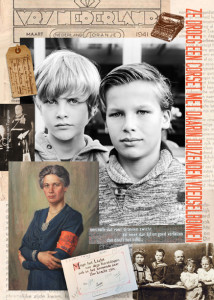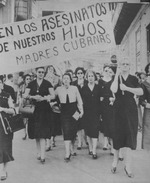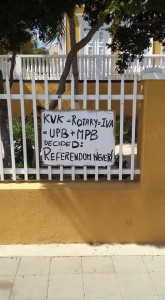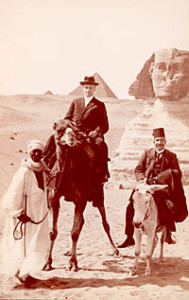
Ills.: Jean Cameron Foto: Lo Andela
“Het is best heftig wat zich allemaal in mijn familie heeft afgespeeld. Mijn opa is Paul van Tongeren. Zijn vader Hermannus van Tongeren jr werd in 1944 met een nekschot doodgeschoten door de Duitsers vanwege zijn verzetswerk. Mijn opa is als tweejarige zijn vader kwijtgeraakt en zijn moeder was zo in shock dat ze niet meer heeft gesproken. Dat vind ik een heel naar verhaal”, vertelt de 12- jarige Sies van Tongeren in het Groningse Haren. Zijn broertje Mart (8 jaar) zit bij het gesprek.
De zuster van hun overgrootvader was Jacoba van Tongeren. Zij was zesendertig jaar toen de oorlog uitbrak en rolde via haar vader, Hermannus van Tongeren sr, generaal en grootmeester in de Orde der Vrijmetselaren, meteen het verzet in. Als oud-militair bracht hij haar militaire beginselen van geheimhouding bij. “Ze is door hem als een jongen opgevoed. Ze heeft als klein kind met hem in de bushbush gewoond in Nederlands-Indië, omdat haar moeder haar niet als kind wilde. Jacoba is waarschijnlijk de enige vrouw die tijdens de Tweede Wereldoorlog een grote verzetsgroep heeft geleid, Groep 2000. Ze was door haar vader getraind om sterk te zijn. Sommige mensen vonden het raar dat een vrouw leidster was van een groep. Maar ik beschouw haar als een stoere vrouw. Ze dacht aan anderen. Dat vind ik bijzonder.”
“Ze droeg een korset met daarin duizenden voedselbonnen. Ze deed net alsof ze zwanger was. De Duitsers stonden voor haar op.”
Groep 2000 werkte met een code die Jacoba van Tongeren had bedacht met het oog op veiligheid. Alle groepsleden, maar ook de vele onderduikers die zij ondersteunde, werden niet met hun eigen naam genoemd maar met een cijfercode. Ook het adres was gecodeerd. Alleen met een sleutel kon je de codes ontcijferen. Uiteindelijk liep het toch mis. Op vrijdag 9 maart 1945 werd het hoofdkantoor van Groep 2000 aan de Stadhouderskade 56 door de Duitsers bezet. Alhoewel Jacoba strikte orders had gegeven dat als er niet op kantoor werd gewerkt, de codesleutel meegenomen moest worden, bevond die zich toch nog op de Stadhouderskade toen de Duitsers er die vrijdagavond binnenvielen.
“Enkele mannen binnen de verzetsgroep gingen tot gewapende actie over, terwijl Jacoba het niet wilde regelen met geweld, maar strategisch. Ze wilde zo min mogelijk risico lopen dat onschuldigen slachtoffer werden. De mannen vonden haar zwak en werden toch gewelddadig. Er ontstond een schietpartij op kantoor en dat liep helemaal verkeerd af. Een belangrijke Duitser is daarbij doodgeschoten. De Duitsers hebben toen als wraak dertig mensen uit de gevangenis gehaald en doodgeschoten bij het Weteringplantsoen. Ze hebben de lijken een paar dagen laten liggen zodat iedereen ze kon zien. Zodat ze bang zouden zijn het verzet in te gaan. Jacoba heeft alles gezien vanuit haar huis. Het was de zwartste dag in haar leven.”
Achteraf heeft ze haar eigen plan uitgevoerd om de sleutelcode alsnog in veiligheid te brengen. “Een schoonmaker heeft van buitenaf met een ladder de ramen schoongemaakt en is, toen alles veilig was, naar binnen geklommen en heeft zo de code veilig kunnen stellen.”
Sies vindt het heel bijzonder dat zijn familie zoveel heeft gedaan in de oorlog. Hij heeft nog niet nagedacht wat hij zelf zou doen als hij ooit in zo’n situatie terecht zou komen, maar hij weet wel dat hij nooit onschuldigen in gevaar zou brengen.
—
 Het verhaal is nooit af…
Het verhaal is nooit af…
Familieherinneringen van de 3e en 4e generatie aan de Tweede Wereldoorlog
Vormgeving & beeld: Jean Cameron, fotografie: Lo Andela
In Het verhaal is nooit af… zijn familieherinneringen van de 3e en 4e generatie aan de Tweede Wereldoorlog vastgelegd. Een twintigtal jongeren is gevraagd welk verhaal een grote indruk op hen heeft gemaakt en welke specifieke betekenis dit voor hen heeft gehad.
Wat weet Senna Pengel over de geschiedenis van haar Joodse overgrootmoeder Sonja van Es? Herinnert Hannah Cameron zich het verhaal van haar opa Arthur die vlieger was bij de RAF? Wat betekenen de familieverhalen van Gerrit van der Veen, Rob de Vries, Cor van Beukering, dokter Crasborn, Roel Walraven, Lotty Huffener, Jacoba van Tongeren en Slamat Faiman voor hun (achter) kleinkinderen?
Alle geïnterviewden hebben op zeer persoonlijke wijze antwoord gegeven op onze vragen en zo zijn de verhalen ook genoteerd. Het resultaat is een palet van verhalen over de Duitse bezetting; de vervolging van Joden; het verzet tegen de Duitsers door onder meer de leden van de CPN, kunstenaars, Indonesiërs, artsen en gewone burgers en welke rol Marokko heeft gespeeld in de bevrijding van Europa. Zeven leerlingen van de 15e Montessorischool Maas en Waal in Amsterdam hebben hun eigen verhaal opgeschreven.
Sammie de Vries:
“Ik hoop dat ik een goede keuze zou maken, door alles wat ik heb geleerd en gehoord. Daarom is het zo belangrijk dingen uit die tijd te koesteren. Het is van belang die discussie levend te houden. Het feit dat je er al over nagedacht hebt voordat het plaatsvindt is eigenlijk al een groot goed. Als we het zouden vergeten is het nog erger dan de Tweede Wereldoorlog zelf, dan hebben we er niets van geleerd, dat is nog verschrikkelijker.”
Doelgroep: 9-18 jaar
42 pagina’s
Het boek is bestellen bij
Stichting Metropool Internationale Kunstprojecten – Amsterdam
Maak Euro 10,60 (€ 7,90 + €2,70 verzendkosten) over op:
Rekeningnummer NL42 INGB0006928168
o.v.v. ‘Het verhaal is nooit af…’ en het adres waar het naartoe gestuurd mag worden
voor meer info: lindabouws@gmail.com of info@jeanc.nl





